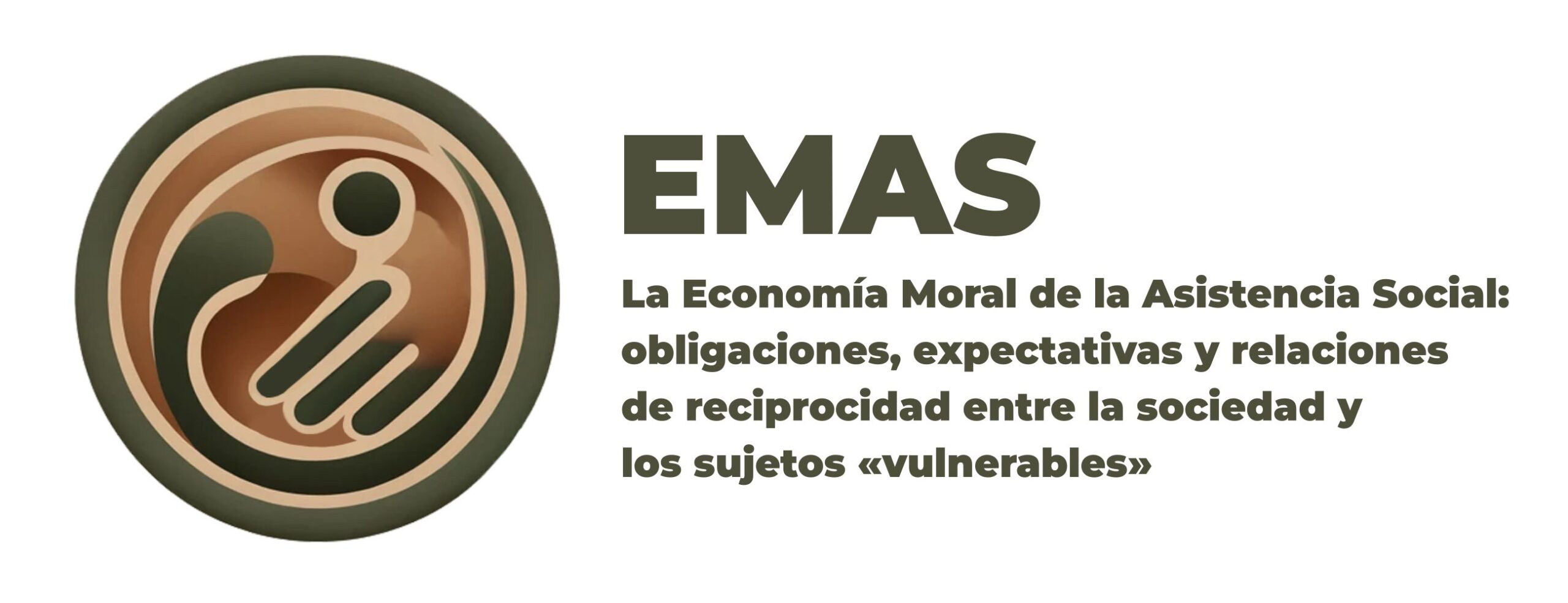The Moral Economy of Social Assistance: obligations, expectations and relations of reciprocity between society and the vulnerable (MESA)
REFERENCIA: PID2022-142465OB-I00
Duración: Octubre 2023 – Septiembre 2026
La Economía Moral de la Asistencia Social (EMAS en adelante) examinará los aspectos morales de las transacciones económicas propias de la asistencia social (tanto pública como privada); un aspecto del Estado de Bienestar que se basa en beneficios no contributivos. Estas transacciones (o intercambios) se pueden conceptualizar como unidireccionales (beneficencia clásica) o bidireccionales (ayuda a cambio de contraprestaciones). Los valores transaccionados pueden ser conmensurables (monetarios) o inconmensurables (ayudas materiales por cambios en el comportamiento de los beneficiarios), sean estas transacciones equivalentes o no.
EMAS se propone recoger, en primer lugar, material empírico que permita la caracterización de la economía moral de la asistencia social en Almería como representativa de la nacional en un contexto global.
El trabajo de campo se centrará, por una parte, en los programas de asistencia social de ONGs que atienden a migrantes residentes en los asentamientos chabolistas; las entidades que trabajan en intervención social y sanitaria con mujeres en situación vulnerable (especialmente en contextos de prostitución) y los programas de asistencia de servicios sociales en Almería ciudad.
En segundo lugar, los datos recogidos, y más tarde analizados, se compararán con estudios similares en Irlanda, donde tres miembros del equipo de trabajo han realizado trabajos de investigación relacionados. Irlanda es uno de los países europeos (junto con el Reino Unido) que mejor representa el modelo liberal de Estado de Bienestar y que constituye una tendencia global dominante en la actualidad, en el campo de la asistencia social, a través de la creciente influencia de programas sociales de tipo «workfare» o «activación».
The Moral Economy of Social Assistance (hereinafter MESA, EMAS in Spanish) will examine the moral aspects of the economic transactions of social assistance (both public and private); an aspect of the Welfare State that is based on non-contributory benefits. These transactions (or exchanges) can be conceptualized as one-way (classical charity) or two-way (help in exchange for consideration). The values transacted can be commensurable (monetary) or incommensurable (material aid for changes in the behavior of the beneficiaries), whether these transactions are equivalent or not.
In Spain, there are not many works on this moral economy. In addition, the scant work that has been done so far on this subject does not focus on social assistance or on the values that are expressed through reciprocal relationships.
Through ethnographic fieldwork based on participant observation, EMAS intends to collect, first of all, empirical material that allows the characterization of the moral economy of social assistance in Almería as representative of the national one in a global context.
The fieldwork will focus, on the one hand, on the social assistance programs of NGOs in Almería that assist migrants residing in the shanty towns of Níjar (Almería); the entities that work in social and health intervention with women in vulnerable situations (especially in contexts of prostitution) and the assistance programs of social services in Almería city.
Secondly, the data collected, and later analysed, will be compared with similar studies in Ireland, where three members of the task force have carried out related research work.
Ireland is one of the European countries (along with the United Kingdom) that best represents the liberal model of the Welfare State and that constitutes a currently dominant global trend in the field of social assistance, through the growing influence of social programs of the workfare type.
EQUIPO
Investigadora principal:
- ÁNGELES ARJONA GARRIDO
Equipo:
- JUAN CARLOS CHECA OLMOS
- FRANCISCO CHECA OLMOS
- ESTEFANÍA ACIÉN GONZÁLEZ
Contratado:
- FRANCISCO ARQUEROS
NOTICIAS

Polémico traslado de 114 inmigrantes a un hotel de El Ejido, Almería: el alcalde se opone
CONTACTO
Proyecto I+D+I La Economía Moral de la Asistencia Social (EMAS)
MESA Project, The Moral Economy of Social Assistance
Centro de Estudio de las Migraciones y las Relaciones Interculturales (CEMyRI)
Edf. Científico Técnico V, 1º planta
Email: emas24@ual.es
Tel. +34 950 214 757
Universidad de Almería
Carretera Sacramento s/n
04120 La Cañada de San Urbano, Almería (España)

